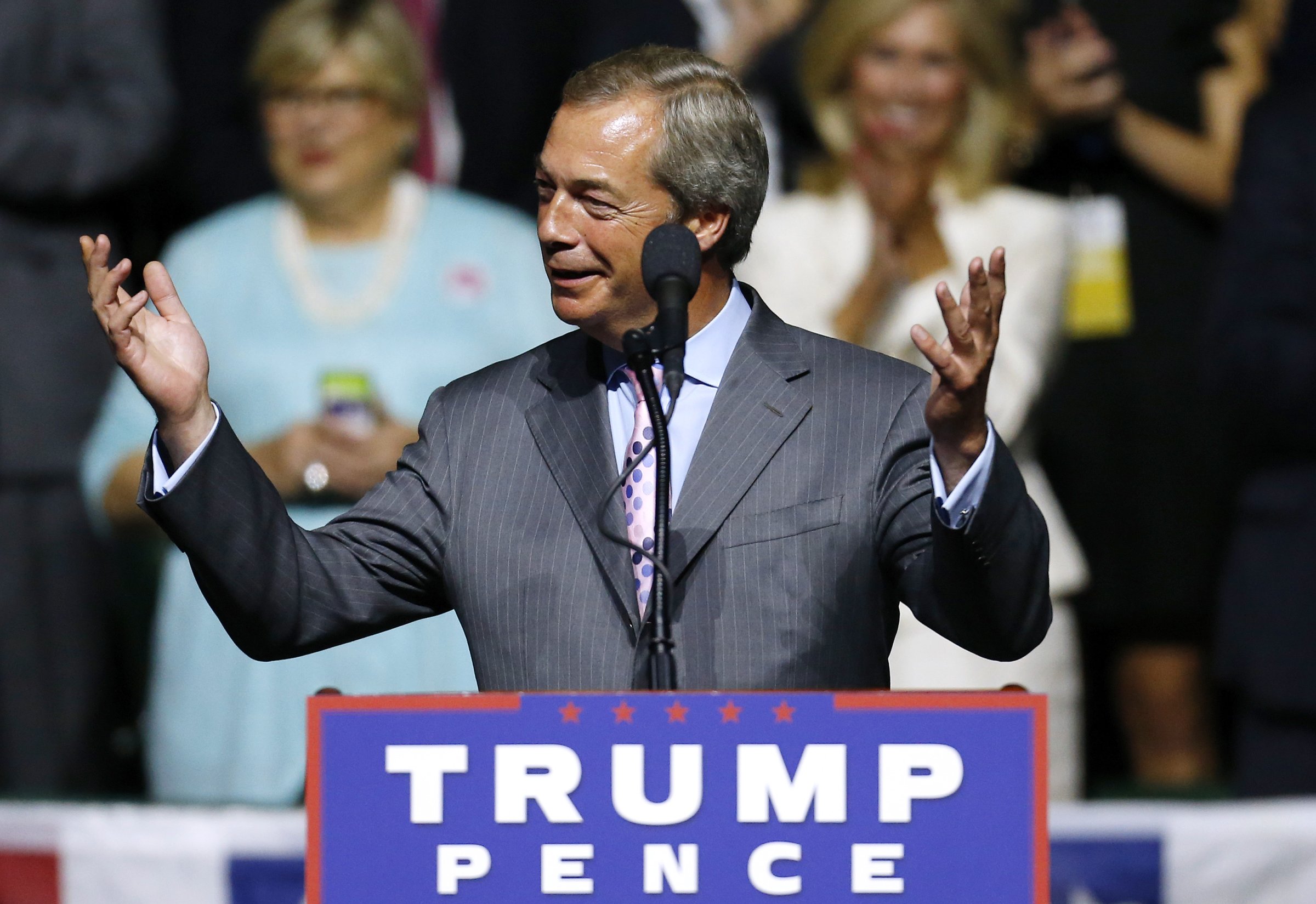
The right-wing British politician who helped persuade Britain to vote to leave the European Union has claimed Donald Trump’s sweeping victory in the U.S. presidential election as the latest result of a populist wave that is set to upturn the political order in Europe in 2017.
“Brexit was the first brick that was knocked out of the establishment wall. A lot more were knocked out last night,” Nigel Farage, the interim leader of the U.K. Independence Party, told TIME on Wednesday. “This is Brexit times three. It is a bigger country, it is a bigger position, it is a bigger event.”
The potent mixture of antielitism and nativism that drove “Brexit” was effectively harnessed by Trump to tap into the discontent of millions of Americans who felt left behind by globalization and the establishment. “Brexit is a story that had so many parallels with what happened in the U.S.” says Farage in a telephone interview from the U.S, where he flew after the results emerged. “And it is something, very wisely, that Team Trump cottoned on to very early.” The former investment banker was even invited to give a speech alongside the Republican on Aug. 25 at a Jackson, Miss., rally.
Now, populist parties in Europe — which include Italy’s Five Star Movement and Marine Le Pen’s National Front in France — stand ready to continue the fight, says Farage. “I don’t think it is finished yet, I think this phenomenon is set to sweep other parts of Europe over the course of a couple years.”
“Hungary is now is basically giving two fingers up to Brussels,” he continues, of Hungarian Prime Minister Viktor Orban’s attempt to reject the E.U.’s plan to relocate refugees. “You get much the same language in Slovakia, in Poland and the Czech Republic.”
Farage was one of the central figures in Britain’s campaign to leave the E.U. in the June 23 referendum. He led the fight for Britain to “take back control” of immigration, its laws and the perceived control of U.K.’s national sovereignty by the E.U. Like Trump, the campaign came under fire for its divergence from facts, xenophobic messaging and dog-whistle racism, recriminations that didn’t stop 17 million Britons from voting to leave the European bloc.
The UKIP politician — a lawmaker in the European Parliament — says he was initially drawn to Trump for his views on small government and border control. “Donald Trump believes in nation-state democracy, Hillary Clinton used the E.U. as a prototype for a larger global union, Donald Trump believes in sensible immigration controls … [and] recognizes the threat posed by Islamic terrorism; Hillary Clinton can’t even bring herself to use the words, Donald Trump believes in helping small and medium-sized business by relieving the regulatory burden, things like this just aren’t even on the agenda on the people who want global government like Hillary Clinton.”
The 52-year-old also praises the President-elect’s approach to foreign policy, even though Trump has been criticized for refusing to commit to defending NATO allies. He’s a pragmatist rather than an isolationist, and will not lead the nation into foreign misadventures like some of his predecessors, says Farage. “Saying you don’t want to enter every potential war in the Middle East doesn’t make you an isolationist, it makes you wise,” he says.
Where Brexit differs from the policy proposals of America’s 45th President, he says, is the issue of trade protectionism: Trump wants more while Britain is desperate to forge new trade deals with other countries after it leaves the E.U. But the special relationship is strong, Farage says. “The only positive trade comment he has made is about the U.K,” he says. “He has said we would be at the front of the queue.”
“One of the good things from a U.K. perspective is we now have an American President who likes our country rather than Obama and Clinton, who look down on us and sneer at us.”
Farage feels personally responsible for this Western, nationalist movement— which he calls “nation-states democracy.” He plans to embark on a tour of Europe in 2017 to continue preaching the gospel of Brexit. “This is the extraordinary thing, those who of us who have these points of view are treated by the establishment as being so disreputable what we shouldn’t even exist,” he says. “I think it is too late now. The genie is now completely out of the bottle.”
More Must-Reads from TIME
- Donald Trump Is TIME's 2024 Person of the Year
- TIME’s Top 10 Photos of 2024
- Why Gen Z Is Drinking Less
- The Best Movies About Cooking
- Why Is Anxiety Worse at Night?
- A Head-to-Toe Guide to Treating Dry Skin
- Why Street Cats Are Taking Over Urban Neighborhoods
- Column: Jimmy Carter’s Global Legacy Was Moral Clarity
Contact us at letters@time.com